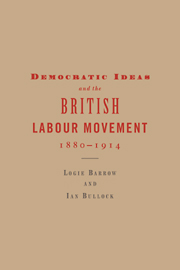Book contents
- Frontmatter
- Contents
- Acknowledgements
- Introduction
- Part 1
- Part 2
- Part 3
- 7 The early 1900s: a hinge period
- 8 Socialists and the state
- 9 Parliamentary socialism? Labour in parliament
- 10 Parliamentary democracy? ‘Fred's obsession’ and the path to the Bradford resolution
- 11 Background to syndicalism: the legacy of the NIGFLTU's failure
- 12 Avoiding the ‘Servile State’. The impact of Syndicalism and Guild Socialism
- 13 1914: an emerging consensus on the eve of Armageddon
- Conclusions
- Appendix: Federation for local Labour historians – and for national
- Index
8 - Socialists and the state
Published online by Cambridge University Press: 09 November 2009
- Frontmatter
- Contents
- Acknowledgements
- Introduction
- Part 1
- Part 2
- Part 3
- 7 The early 1900s: a hinge period
- 8 Socialists and the state
- 9 Parliamentary socialism? Labour in parliament
- 10 Parliamentary democracy? ‘Fred's obsession’ and the path to the Bradford resolution
- 11 Background to syndicalism: the legacy of the NIGFLTU's failure
- 12 Avoiding the ‘Servile State’. The impact of Syndicalism and Guild Socialism
- 13 1914: an emerging consensus on the eve of Armageddon
- Conclusions
- Appendix: Federation for local Labour historians – and for national
- Index
Summary
The ‘gulf’ reaffirmed
Should Social-Democrats accept the label ‘state socialists’? Considering this question in 1905, Hyndman concluded that they should not for two reasons. There was an ‘ever-present danger of fostering Caesarism and crystallising bureaucracy’. Also, state control could leave intact ‘competition, wage-earning and the whole of the forms of wage slavery.’ This was the antithesis of Social-Democracy which aimed at ‘a complete social revolution, which shall abolish the present State and establish a Society’ in its place. The state, as opposed to the community, he went on, had always been based on class privilege and property. Once private property ‘in the powers of producing and distributing wealth’ had been abrogated, the state, as a force dominating the people and ‘holding the balance’ between conflicting interests would be replaced by ‘a co-operative Social-Democracy’. Although it would be necessary to ‘use the State against both landlords and capitalists’ during the ‘transition period’, this would be done with the express intention of bringing about ‘an end to the State’.
The ‘state socialism’ from which Hyndman wished to distance ‘social-Democracy’ was well represented during the same year by Ramsay MacDonald‘s Socialism and Society. When the book appeared, Labour Leader‘s reviewer, ‘G’ (Glasier?), called it the ILP‘s ‘most important contribution … to … international Socialist Literature’ and, in particular, as a ‘tremendous assault’ on Marxism. His treatment of the state was singled out for praise.
- Type
- Chapter
- Information
- Democratic Ideas and the British Labour Movement, 1880–1914 , pp. 162 - 177Publisher: Cambridge University PressPrint publication year: 1996

